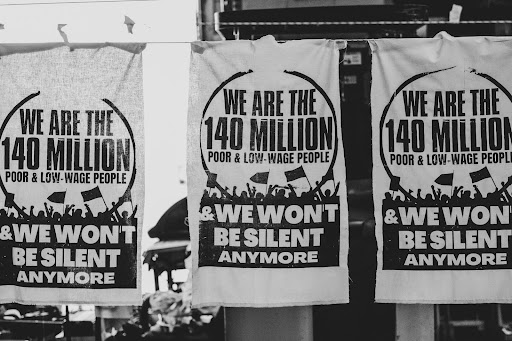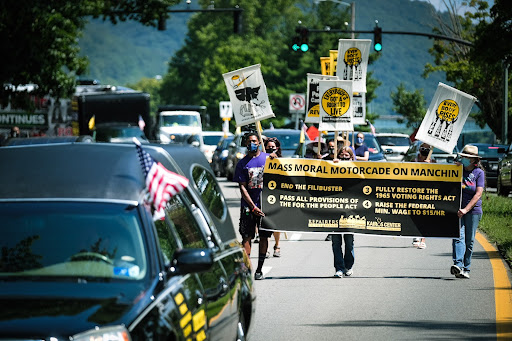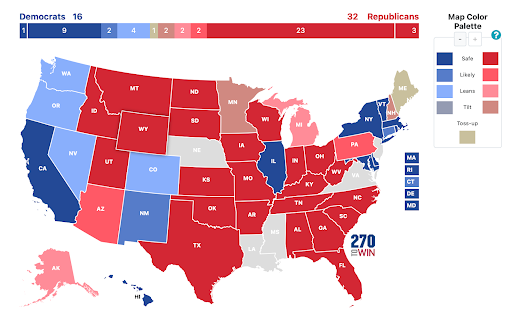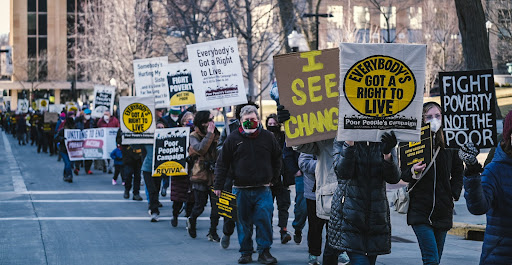
This month, the Kairos Center remembers General Gordon Baker, Jr. (September 6, 1941 – May 18, 2014), a labor organizer, organic intellectual and movement leader from Detroit. Known as “Gen” to his friends and colleagues, he fought relentlessly to organize workers in the US and around the world. Gen was one of the earliest draft resisters to Vietnam and a founder of the League of Revolutionary Black Workers. He was a leader in United Auto Workers (UAW) Local 600, one of the foremost locals in the nation, for decades. Towards the end of his life, he was organizing retirees around health care. Gen was also a mentor to many Kairos staff and his commitment to addressing systemic racism, poverty, climate crisis, the denial of health care and the war economy have inspired generations of leaders.
In this policy briefing, we take Gen’s commitments to heart in a review of the political and policy terrain. Since 2021, there have been significant advances and retreats on President Biden’s Build Back Better agenda and mounting assaults on our democracy. These shifting dynamics have made it even more important for the Poor People’s Campaign (and its two anchor organizations, the Kairos Center and Repairers of the Breach) to escalate its efforts to: build the power and organization of the nation’s 140 million poor and low-income people, change the narrative on systemic injustices and advance policies that center those most impacted by these injustices. Through the wins, losses and compromises, the Campaign has grown its numbers, influence and resolve to push forward, together, on all of its priorities.
As Gen said many times in his life, “Dare to fight! Dare to win! Fight, fail, fight again, fail again, fight on to victory.”
A BUILD BACK BETTER BREAKTHROUGH
When President Biden was elected into office, he promised that his administration would make “ending poverty a theory of change.” His early 2021 Build Back Better (BBB) agenda was going to improve the quality of our daily lives with public investments in childcare, paid family and medical leave, community college, housing and health care; meaningful and just immigration reforms; and an ambitious climate agenda. The vast majority of this spending would have been covered by rolling back the 2017 Trump tax giveaways, addressing offshore tax dodging and taxing investments the same as wages. Finally, our leaders were taking steps towards a more equitable, just and green economy by prioritizing poor and low-income people.
In March 2021, the American Rescue Plan Act (ARPA) was passed by Congress and signed into law, a first step in the BBB agenda. Among other things, it temporarily expanded the Child Tax Credit and Earned Income Tax Credit to reach millions of poor and low-income households. A few months later, the Infrastructure Investment and Jobs Act (IIJA) was enacted, to improve our roads and bridges, replace lead pipes and expand public transit, rail systems and broaden access to high-speed internet. Notably, these two bills passed without a single Republican vote for ARPA and just 13 House Republican votes for the infrastructure bill.
Then in November 2021, the House of Representatives passed the Build Back Better Act (BBBA). The $2.1 trillion bill carried forward even more of President Biden’s agenda; however, it stalled in the Senate, after Sen. Joe Manchin publicly declared he would not support it. When negotiations resumed in 2022, the agenda and budget were trimmed down significantly. They culminated in the Inflation Reduction Act (IRA), which was enacted a few weeks ago. The IRA will make investments to reduce greenhouse gas emissions and lower home energy bills, allow Medicare to negotiate cheaper prices for prescription drugs, cap insulin prices for Medicare recipients, expand ACA subsidies so millions of people can keep their health care, raise taxes on billion-dollar corporations and stock buybacks, better equip the IRS to go after high-income tax dodgers and reduce the deficit by $300 billion. Once again, not one Republican voted for either of these bills.
Between ARPA, IIJA, IRA and the Chips and Science Act, which will support and secure semi-conductor supply chains and telecommunications networks, the Administration has committed $3.5 trillion to these policies over the next several years. Just a few days after signing the IRA into law, President Biden also issued an executive order to forgive $10,000 of student debt and up to $20,000 for Pell Grant recipients. Through this one executive action, some 20 million borrowers will see the full balance they owe on their federal student loans canceled.
CELEBRATING THE WINS, LEARNING FROM THE LOSSES
These are historic steps towards relieving the load of poverty and inequality that at least 140 million have been facing for far too long. In fact, the Poor People’s Campaign (PPC) – as well as its two anchor organizations, the Kairos Center and Repairers of the Breach – have been calling for many of these policies for years, if not decades. Since 2021, the PPC has been pushing for these and other policies that center poor and low-income people with great intensity.
Shortly after President Biden assumed office and members of the 117th Congress were sworn in, the PPC issued 14 Policy Priorities for the Administration’s First 100 Days. In February 2021, it launched a 14-week season of Moral Mondays focusing on these priorities through coordinated online and in-person actions, educationals and press events. In May 2021, the PPC launched the Third Reconstruction Congressional Resolution to End Poverty and Low Wages from the Bottom Up. Sponsored by members of Congress from more than 20 states, the Third Reconstruction is a political and moral vision that Rev. Dr. William Barber, II, national co-chair of the PPC and President of Repairers of the Breach, has been calling for for many years. Some of it has been carried forward in the legislation that has been enacted to date.
In the second half of 2021, from June to December 2021, delegations of PPC state leaders, clergy and organizational leaders put their bodies on the line for the Third Reconstruction and our policy priorities. Thousands of people participated in non-violent civil disobedience during the summer of 2021 alone. The PPC also marched for democracy in Texas, organized actions and caravans in West Virginia and testified in front of Congress.

Even as momentum around the BBB agenda flagged in 2022, the PPC re-committed to bringing tens of thousands of people to the nation’s capital for the Mass Poor People and Low-Wage Workers’ Assembly and Moral March on Washington and to the Polls. From January to June 2022, it reached out to all of its contacts to come to DC on June 18. The PPC national mobilizing tour visited 10 cities and 400 national partner organizations, labor unions and faith denominations signed on to the effort. On June 18, approximately 100,000 people stood together on Pennsylvania Avenue to hear directly from poor and low-income people about the conditions we are facing and the moral policies we need to confront them.
Over these past several months, the PPC reached millions of people, thousands of whom are taking on new responsibilities and carrying forward the local, state and national work of the Campaign.
Therefore, we must celebrate what has been accomplished by this Administration so far. The policies that have been enacted are due in part to the tireless efforts of the PPC, and many others, who kept calling for policies that centered the poor. Even when it was clear that all of its priorities may not be enacted, the Campaign also knew that every step forward was an advance towards the nation we have yet to be. Every time a policy was enacted that improved the lives of poor and low-income people – even temporarily – our consciousness was awakened to a different reality, one where we can pay for school supplies, groceries and birthday parties, where we can have clean water running through our pipes and where we don’t have to go into debt to afford our medications. We saw that poverty, hunger, housing insecurity and other injustices are, indeed, policy choices, and not the failure of individual people or communities.
The policies that have been enacted are due in part to the tireless efforts of the PPC, and many others, who kept calling for policies that centered the poor.
Equally, every time a policy fell short of the PPC’s demands, the Campaign took careful note. Whether it was around guaranteeing access to affordable health care, ensuring living wages, paid leave or childcare, making the pandemic expansion of the CTC and EITC permanent or securing and expanding the fundamental right to vote, several gaps remain, including that:
- Most of the pandemic programs that benefit poor people – like the expanded unemployment insurance, CTC and EITC, and moratorium on evictions – have been over for months, leaving 40 percent of the country struggling to meet their typical expenses.
- Although the federal minimum wage ($7.25) is at its lowest value in 66 years and rising prices have outstripped any rise in wages at the state level, there has been no progress on raising the federal minimum wage.
- Housing insecurity is also on the rise, too, but instead of reinstating pandemic era policies, raising the minimum wage or providing adequate and affordable housing, every state now has laws that criminalize homelessness in at least one of its major cities.
- In sharp contrast, the wealth of the wealthy remains more or less intact. The tax provisions of the IRA are not really a rebuke to the excesses of corporations or Wall Street. According to Wall Street analysts, the taxes will be very “modest” and will not discourage the practice of stock buybacks.
- The IRA also makes several concessions to fossil fuel companies, including opening up millions of acres of public lands and public waters to new oil and gas drilling leases, which will compromise the bill’s climate gains.
- While student loan relief will be as much as $20,000 for some borrowers, the average debt canceled for businesses that received loans through the Paycheck Protection Program was more than four times as much, or about $95,700. In fact, 94% of the $800 billion that was borrowed through the PPP (most of which went to large businesses) has been canceled.
- Despite inflation fears around social welfare spending, there seem to be no limits to expanding the war economy. Even though we have spent nearly $21 trillion in war, surveillance, policing and incarceration since 2001, Congress has authorized $1.4 trillion for “national security.” President Biden also recently announced another $37 billion that will add 100,000 police to the 900,000 strong police force we already have.
When these policies are measured against the PPC’s policy priorities, it is very clear that the politics around the BBB agenda has shifted tremendously, from an intention to centering the poor to now centering Wall Street, fossil fuels, big business and wealthy interests.
DEMOCRACY IN CHAINS
While it is easy to be discouraged by these shifts, these compromises reflect a deeply contested political terrain that is facing grave threats from within. In fact, a rolling coup is underway on our already impoverished democracy.
Before the 2020 elections, dozens of states had already enacted voter suppression laws that made it harder for millions of people to participate in elections. In 2021, another 19 states passed voter suppression laws that will impact as many as 55 million voters this year. Keeping poor people, especially poor people of color, away from the ballot has empowered an extremist segment of the Republican party to assume more and more influence over our national priorities. Consequently, the Republican party as a whole has voted against most of the BBB agenda and blocked legislation that would expand voting rights (in the latter, they were joined by two Democrats, Sen. Manchin and Sen. Simena).
At the same time, the conservative majority of the Supreme Court is “working to undermine our government supposedly of, by, and for the people,” by weakening campaign finance regulations, gutting safeguards to the ballot and allowing Republican partisan gerrymanders in the states. Republican majorities now control 32 state legislatures and 23 states are under Republican trifectas, where one party controls both the legislative and the executive branch.

These two levers of power, one at the federal and the other at the state level, acted in unison when the Supreme Court issued the Dobbs decision, reversing Roe v. Wade and repealing a previously granted fundamental right for the first time in its history. Because of their strategic takeover of state power, conservative politicians were able to enact trigger bans that took effect as soon as Dobbs came down. Two months later, 12 states have banned abortion. All of them have Republican dominated state legislatures and ten of them are Republican trifectas. In doing so, they also paved the way for a massive expansion of state-based surveillance and border policing, which will disproportionately impact poor and low-income women.
In a few months, the Supreme Court will hear a case out of North Carolina that may give these state legislatures even greater control under a fringe legal theory called the “independent state legislature doctrine.” Their ruling could give state legislatures more authority over elections than governors, state courts, election commissions, citizen referenda or other forms of ballot initiatives. These legislatures could, in fact, overturn election outcomes – similarly to Donald Trump’s attempt after the 2020 elections, but on a mass scale. Given that Republican dominated legislatures control over 300 electoral votes, this could mean that any semblance of representative democracy is dismantled within two or three election cycles.
More than determining who sits on Capitol Hill or in the White House, this would re-shape the daily fabric of our lives. From state and local revenues and expenses to what constitutes a fair and adequate minimum wage or what we pay for our water and utilities to public school and policing budgets, these decisions are all made by state and local governments. Without an accountable and representative democracy at every level – local, state and federal — our ability to influence, let alone inform, these decisions would be completely undone.
OVERTURNING THE MADNESS
Although these attacks are deeply concerning, there have also been some momentous gains in voting rights at the state level, especially around restoring voting rights for formerly incarcerated people. In North Carolina alone, and led by Forward Justice (a center for law, policy and strategy based in the South), a network of formerly incarcerated people and their families and the Forward Together Moral Movement, over 50,000 people have regained their right to vote. There is an incredible amount of power in these new voters: their votes account for more than one-quarter of the average margin of victory in the midterm contests in North Carolina over the past decade; they also account for two-thirds of the margin of victory in the state for the 2020 presidential race. These votes are also just one segment of a the poor and low-income electorate in North Carolina, which is 3.4 million people strong, indicating a deep well of untapped political power that could be newly engaged in this election cycle.
Tayna Fogle, a poor, Black leader in the Kentucky Poor People’s Campaign spoke to this power at a vigil for voting rights organized by the PPC earlier this year. Tayna was formerly incarcerated and regained her voting rights in 2019. She said, “I served out a 10-year prison sentence and I stand in the gap for all those folks who made a mistake, but aren’t mistakes. Do you know there are over [700,000] Kentuckians, poor and low-income, who could have voted but didn’t in 2020? There are many hardships in trying to get to the ballot box. And what’s hurting me in Kentucky is hurting people in Alabama, it’s hurting people in West Virginia, and across the nation. Can you imagine all the poor and low-income people coming to the ballot box? Ok, yeah, it’s difficult to go to the ballot box, but what if we did everything we could to make sure our vote counted? We could overturn the madness that’s going on.”
As Tayna and the PPC remind us, we cannot cede the political terrain, either to the vagaries of our political system or the rising tide of extremism. They are right for at least two reasons:
First, poor and low-income people suffer the worst impacts of the policy gaps listed above. They are also the main targets of those advancing the rising tide of extremism, especially those who are unhoused, unemployed, uninsured and undocumented. These policies and threats force 140 million poor and low-income people in this country to live on the frontlines of the climate crisis and war, and they face down the policy violence of systemic racism, poverty and white Christian nationalism every day. They have the least to lose in terms of changing our current policies, politics and economic systems; they also have the most to gain from advancing a moral agenda that centers their needs and demands. This is what makes the 140 million the most consistent fighter for democracy – and democracy in its truest sense, meaning our ability to both participate in and shape the decisions that impact our daily lives.

Second, the 140 million hold an enormous amount of political power. In 2020, there were over 85 million poor and low-income people who were eligible to vote (including the 3.4 million in North Carolina). Over 50 million of them cast a ballot in the 2020 presidential contest. We know these tens of millions of voters are not voting the same way. Objectively, however, these voters account for 1) nearly one-third of the voting electorate nationally; 2) at least 20 percent of the electorate in 45 states; and 3) close to or more than 40 percent of the electorate in key states in the Midwest and South. Perhaps because of their numbers and political potential, they also face the greatest barriers to vote.
Britnie Remer, a poor white leader from the Wisconsin Poor People’s Campaign spoke to some of these challenges, alongside Tayna, at the PPC voting rights vigil. She said, “I live in Wausau, Wisconsin. I grew up in poverty, raised by an amazing single dad who I watched struggle every single day…At 35 years old, I have spent all of my adult life working low-wage jobs. From the ages of 18 to 26, I worked in the service and hospitality industries where most tipped positions are paid a sub-minimum wage. For several years, I held two jobs working 70 plus hours per week while going to school full-time and still barely made enough to cover my basic needs, let alone any type of emergency. I can speak firsthand about the impossible task of making it to the ballot box, when you have to be at one job by 7am, and once your shift is done, go straight to the next for another eight hours. In the small city where I currently live…many people rely on our already inadequate public transit, yet the buses stop running at 6:30pm, a full hour and a half before polling places close. The routes do not come even close to the only DMV in the area, making attaining a valid ID, extremely difficult, and disproportionately affecting poor, low-income, elderly, and disabled community members. This part of the state is also very rural, so our Internet is overpriced, unreliable and all too often unavailable, which creates chaos and confusion when polling places are moved and last-minute changes are made like we saw happen across the country in 2020. Expanding voting access would ensure that more, not all, but more of the 2.1 million eligible low-income voters in Wisconsin would have their voices heard. As Dr. King said of the millions of poor and dispossessed in this country, ‘if they can be helped to take action together, they will do so with a freedom and a power that will be a new unsettling force in our complacent national life.’”
Indeed, if tens of millions of voters could be organized to take action together – across race, religion, and other lines of division and not only at the ballot box, but in the courts, the legislatures and the streets – we could not only win back voting rights, but also protect and expand our democracy. We could even win the agenda that the PPC has been pushing for these past months and years.
For anyone who questions if this kind of “fusion” is possible, the recent experience in Kansas offers a fitting response. Although Donald Trump carried the state by 15 points in 2020, over 500,000 Kansans voted to defend abortion rights, in an election deliberately constructed for them to lose: “Republicans in the state legislature…had carefully selected a date with historically low turnout, drafted abstruse ballot language and campaigned on public misdirection.” Yet, grassroots efforts to reach eligible voters to protect access to abortion broke through partisan messaging, reaching both Democrats and moderate Republicans, as well as rural conservatives. Together, they won in at least 18 counties across the state and defeated the ballot measure.
If tens of millions of voters could be organized to take action together – across race, religion, and other lines of division and not only at the ballot box, but in the courts, the legislatures and the streets – we could not only win back voting rights, but also protect and expand our democracy.
There are real issues that cut across the ideologies of both parties and around which people will take action, many of which are present in the PPC’s policy agenda. This means that what the PPC made possible with the BBB agenda is only a glimmer of what it has yet to do.
Returning to General Baker’s words of wisdom, forged in a lifetime of struggle for justice: “Dare to fight! Dare to win! Fight, fail, fight again, fail again, fight on to victory.”